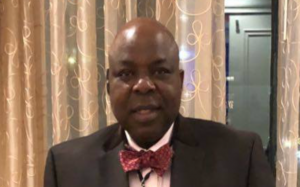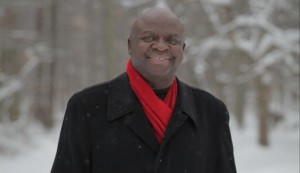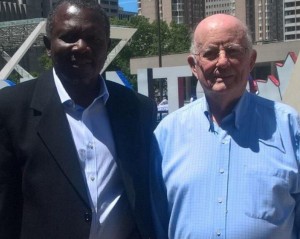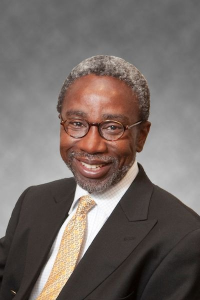The article uses existing materials on the Internet. The links to the full articles are given so that full credits for such copied materials may go where they belong. When materials are not referenced this way, the materials are essentially mine or digested from other works.
This is a response to a friendly conversation from a Pentecostal friend that wants to know how our beliefs differ on the above issues
Prayer, Tongues, Holy Spirit
Approach from the point of view of Christian History, Nigerian Church History, Scriptural Understanding or Personal Experience.
Church History
Who were the acknowledged greats in faith since Apostle Paul? Augustine, Bishop of Hippo or Ambrose, his mentor. Athanasius, the hero of the Aryan controversy that gave the church the Athanasian Creed? Jerome the translator of the Bible or Wycliffe, Huss and Tyndale who bled for what they believed and led, to the availability of the word among the laity.
Then we arrive at Martin Luther the father of the reformation in the 15th century. Ignatius Loyola, Erasmus and others at the opposing end. Is it Aquinas the gentle scholar and translator and John Calvin the Christian statesman? None of these people suffered from the doctrine of “Holy Spirit with the evidence of speaking in tongues”. In fact, the only church great that can be remotely associated with this would-be John Wesley. That is a man, who, if he were to come back to life and see what the Pentecostals are doing with some of the things he taught, would faint immediately.
There was a remarkable story in one of John Wesley’s journals: There was this “devil possessed man in the King’s palace who “manifested whenever a passage of the scriptures was read. He was calm when you read from classical literatures translated to English. This behavior became problematic and they brought him to the king’s attention.
King George, I suppose, called for the scholars from Oxford and they read the same passages in Latin and Greek. The demon-possessed man did not react to the scriptures when read to him in these languages. It was immediately concluded that the demon that possessed him could speak only English – need not be feared!
“It seems, then, that tongues-speaking, whether unknown utterances or miraculous gifts of languages have been reported throughout history. However, what makes Pentecostalism unique is that never before has tongues-speaking been given the doctrinal importance that modern Pentecostals gave to it.
“Pentecostals… were the first to give doctrinal primacy to the practice. Though Pentecostals recognize such sporadic instances of tongues-speaking and other charismatic phenomena throughout the Christian era, they stress the special importance of the Azusa Street revival, which occurred in… 1906 to 1909 and launched Pentecostalism as a worldwide movement.” [18]
“But to understand why Pentecostals were the first charismatic movement in history to give tongues-speaking theological importance we need to understand the theological roots of Pentecostalism.
Why Pentecostalism began
(Full Article )
Pentecostalism began as a worldwide movement when a revival of tongues speaking at the beginning of the 20th century attracted international attention. Speaking about the origin of Pentecostalism, Vinson Synan (Ph. D., University of Georgia) says, “The Topeka and Los Angeles events took place in a turn-of-the century religious environment that encouraged the appearance of such a Pentecostal movement.” The question is, what was the religious environment that encouraged the appearance of Pentecostalism? What prepared the world for Pentecostalism, historically? In other words, why did Pentecostalism begin?
Firstly, people were seeking the “gift of languages”. [2] Among those committed to world evangelization serious concerns arose over how the unreached millions were going to hear the gospel before the end. Several factors generated these concerns: The missions movement had spent considerable time and energy but the numbers of conversions of native peoples was alarmingly small; the premillennialists’ gloomy assessment of the immediate future caused Christians in this movement to expect the condition of humankind to get worse before the imminent return of the Lord; and then when the arms race of the 1890s occurred and the end of the century was approaching, the Christian expectation of the end of the world was considerably heightened.
Widespread interest in the gifts of the Spirit convinced some that God was going to restore the gift of tongues (identifiable human languages) to the Church to equip them to preach the gospel in other countries, in preparation for the end. In 1895 the widely read Holiness author W. B. Godbey predicted: “[The “Gift of Language” is] destined to play a conspicuous part in the evangelization of the heathen world, amid the glorious prophetical fulfilment of the latter days. All missionaries in heathen lands should seek and expect this Gift to enable them to preach fluently in the vernacular tongue, at the same time not depreciating their own efforts.” [3]
Frank W. Sandford was another teacher who advocated the missionary use of tongues-speaking. He spread this teaching in his publication “Tongues of Fire” through which he endevoured to rapidly evangelise the world. He and others were praying and expected to receive the gift of “power and eloquence” for evangelism. This desire for the gift of languages set the stage for the revival of tongues speaking that occurred in the early 1900s.
Secondly, people were seeking a restoration of the “full” gospel. The Holiness movement sought to restore what it understood to be New Testament Christianity to the Church in the last days in preparation for Christ’s return. This led to the movement reforming existing theology to develop what it saw to be the “full” gospel. Reflecting this desire, A. B. Simpson blended together four themes of Christ as Savior, Baptizer, Healer, and Coming King. In time this was described as the “full gospel” or “fourfold gospel.” [4] This change of theology set the stage for Pentecostalism.
“By the turn of the century, the Holiness movement had become preoccupied with the “Pentecostal reformation of Weslyan doctrine” and the four themes of the full gospel. In fact, when the Pentecostal movement began a few years later, only the priority given to the gift of tongues distinguished it theologically from Holiness beliefs.”
Thirdly, people were seeing spiritual experiences as “crisis” events. The Holiness movement taught that Christian spirituality involved seeking distinct experiences that occured as instant events. This in turn set the stage for the Pentecostal doctrine of Spirit baptism as a separate experience to conversion.
“Not only did such Holiness teachers emphasize conscious religious experiences, they tended to encourage persons to seek for them as “crisis” experiences that could be received in an instant of time through prayer and faith. By 1890 the Holiness movement began to think of religious experiences more in terms of crisis than in gradual categories. Thus the Fire-Baptized Holiness Church taught instant conversion through the new birth, instant sanctification as a second blessing, instant baptism in the Holy Ghost and fire, instant divine healing through prayer, and the instant premillennial second coming of Christ.”
Fourthly, there was a need for “evidence” of the second work. Benjamin Hardin Irwin was a radical Weslyan Holiness preacher who taught a third work of grace for power in Christian service. In 1895 he began teaching that the second work of grace initiated sanctification and the third brought baptism in the Spirit. This “third blessing” was called “the fire.” Irwin named his group the Fire-Baptized Holiness Church, beginning another movement that started new groups across America and Canada. This created the problem of needing evidence to distinguishing between those who had received the third blessing from those who had the second only. This problem was part of the reason why the mainstream Holiness Movement rejected his as the “third blessing heresy.”
This controversy laid an important foundation for Pentecostalism because it crystallised the movement’s commitment to a two-stage work of the Spirit (which would be simpler to identify). It also highlighted the need to clarify what is the nature of the second work of grace (which would be empowerment, not sanctification). In addition, the Irwin heresy (as it was called) revealed the need for an evidence for the second work of grace. This again set the stage for Pentecostalism which provided that evidence. Irwin later joined the Pentecostal Movement.
To summarise, the historical situation at the turn of the nineteenth-century that encouraged the appearance of Pentecostalism was a widespread desire for the gift of languages for world evangelisation, the desire for a restoration of the “full gospel” involving Spirit-baptism as a post-conversion experience and the miraculous gifts such as healing, the emphasis on spiritual experiences as “crisis” events, and the theological necessity of an evidence to distinguish those having received subsequent works of the Spirit from those who had not.
But in order to understand the origin of Pentecostalism completely we also need to understand how early Pentecostal thinkers themselves interpreted the historical events surrounding their beginnings. Did they themselves understand their doctrine of tongues-speaking to be unique in church history? Did they interpret the events surrounding the beginning of the twentieth-century as the end-time restoration of the “Apostolic faith” in preparation for Christ’s return?
Nigerian Church
The gospel that took root in Nigeria was the handiwork of the main groups: The Church Mission Society (supported but not limited to the Anglican/Methodist Church. In fact, the first missionaries of this group were Germans, not English), The Roman Catholics. To a lesser extent, there were the evangelical groups such as Baptist, ECWA, COCIN and several others. Among these groups, we owe the Bible translations and institutional establishments of Christianity such as schools, hospitals, orphanages, bible translations, hymn books, Christian literature, etc. that we have today.
The Pentecostal churches have contributed little more than noisemaking to the Nigerian Church. Cherubim and Seraphim Movement, Cele, Yahweh Church of TB Joshua, Christ Embassy, Living Faith, Redeemed, Deeper, etc. cannot hold a candle to the deep work of evangelization wrought in this land by the CMS and the Roman Catholic church – take any metric you want. These movements are at best mediocre, at worst, commercial agencies for expanding the influence and wealth of their proprietors who often function and owners of the yard.
From the Protestant perspective, the real greats in the evangelization of Nigeria are Samuel Ajayi Crowther, Townsend and Hinderer, Archdeacon Dennis, W Banfield, etc. These people did not know about the “Holy Spirit, with the evidence of speaking in tongues”.
As the previous section clearly shows, this formula came about from 1906 in the US. It has had the effect of making Christians – mostly converted through the efforts of others, to become highfalutin and overconfident in their ignorance of church history and basic biblical doctrines! It has turned the Holy Spirit, blasphemously, into a noisemaker.
Historical Scriptural Understanding of
Hymns and the Holy Spirit
Let’s talk about hymns. To tag hymns as “Anglican”, “Catholic”, etc., is to misunderstand the historical development of the Church of Jesus. There is a Pentecostal reductionist idea of expressing satisfaction in the feeling that something makes you “feel good”, “feel blessed”, “Spirit ministered to my spirit”, etc. as answers to questions on the logic, value, and purpose of Christian singing. This attitude, a major reason why Pentecostalism is often an undefined mumbo jumbo of incoherent beliefs, is an extremely low bar to set when we consider hymns and what makes Christians to sing. Paul and Silas, in jail for preaching the gospel, after they had been given a thorough lashing,
25 About midnight Paul and Silas were praying and singing hymns to God, and the prisoners were listening to them, 26 and suddenly there was a great earthquake, so that the foundations of the prison were shaken. And immediately all the doors were opened, and everyone’s bonds were unfastened. Acts 16:25-26.
What is a Christian Song?
We lost a lot of information in the sense that the Bible did not record for us the lyrics of their singing. Suffice it is to know that the Church of Jesus Christ has followed Paul and Silas and has been singing hymns for 19 centuries before the movement described above metamorphosized into Pentecostalism. It is therefore a pertinent thing to ask: What is a hymn and why do Christians sing? What does it achieve? A robust answer to these will help us understand how to judge singing and increase its value to the profit of our souls.
1. Praise to God. St Augustine defined Hymn as ‘a song with praise of God’ and by that emphasizes the fact that a hymn is usually directed towards God. That statement is of course quite narrow as there are many hymns directed to us, that are words that we use to encourage ourselves, and even songs of protest as evidenced in some Negro spirituals, which are hymns in their own right. A people oppressed, having no other tool for protest and self-encouragement, reverted to this form and tool.
2. Friendly Form of Mysteries. The Gospel, according to Paul (I Cor 4:1), is the “stewardship of the great mysteries of God”. One thing a hymn does is to place these mysteries in a friendly, accessible form. A young person, for example, may find the Creeds of the Church, a bit heavy and intellectually demanding to follow; yet every little child can sing with Mrs Cecil Frances Alexander: “All things Bright and Beautiful”, or “Once in Royal David’s City”, etc. and the same Creeds are packaged in a friendlier and accessible form!
3. Direct Teaching. Not only are Mrs Alexander’s compositions attractive because of their friendliness, they also make for easy remembrance. Hymns are much easier to call from memory than Bible verses. They are therefore a formidable pedagogical weapon in the Church’s arsenal. There is yet no doubt that, sung with understanding and meaning, they afford the same spiritual satisfaction and enjoyment that Pentecostals crave without sacrificing rigor. Mrs Alexander, a bishop’s wife, wrote some of these hymns to paraphrase the basic essence of church beliefs as written in the Historical Creeds!
4. Corporate Prayer. The next issue we need to understand is that Hymns are veritable prayers for corporate worship! The orthodox churches that use a lot of hymns often create confusion in the liturgical services by misreading this fact: We rush through the hymns and go into prayers, forgetting that, in the hymns, we are actually already in corporate prayers! Reiteration of the words of the hymns as a preface to the prayer sessions may, in fact, create a more satisfying corporate prayer experience! Listen to the great immortal words!
When we add these points together, we discover that hymns are among the most influential and potent ways by which faith is transmitted and practiced. “A feature of hymns which makes them increasingly valuable at the present time is their interdenominational character Many hymns in current use are common to most branches of the church, at least so far as any particular geographical area is concerned. In Christian song churches have forgotten their quarrels and men have lost their limitations, because they have reached the higher ground where the soul is content to affirm and adore.”
A more thorough definition of a Christian Hymn could be a “metrical composition to aid worship.” Naturally, such a composition is a hymn because it can be used in private or public worship and, usually, has been set to music in some form. The one-liners that are popular in Pentecostal settings may “bless my soul”, “speak to my spirit”, etc., they need some more dedicated work in theological upgrading to rise to the level of hymns. And that can, and ought to be attempted. I say this, not to discourage their usage, but to call for a more dedicated effort to improve their quality and expand their usefulness.
The Holy Spirit
Talking about the Holy Spirit, it is customary for Pentecostals to accuse “Orthodox Christians” of not “believing in the Holy Spirit”. It is Pentecostals that do not believe in the Holy Spirit. What Pentecostals preach is “Holy Spirit with the evidence of Speaking in Tongues” Of course, I do not believe in that formula at all! But, I believe in “the Holy Ghost, The Lord, the giver of life, Which proceeded from the Father and the Son, Whom with the Father and the Son is to be worshipped and Glorified; He spake through the Prophets”. Here is what the Bible teaches. I am ready to fellowship with my Pentecostal brethren. I can tolerate them. I cringe at some of their practices, but I can bear. The first step to fellowship and understanding is that they too be tolerant and understanding that not interpreting the Holy Spirit the way they do doe not prove unbelief!
As a first step on this fellowship effort, I propose that we read, the following passage responsively, without necessarily disputing or commenting initially. Let us allow this to seep into our hearts as we learn the sincere milk of the Word!
I Cor 14: 1-end
Let us read I Cor 14 responsively and try not to argue or interpret.
Personal Experience
Here is my sermon on the topic. It will tell you what I hold, practice, and believe on this issue. I think the spiritual strategy of prayer as taught in Pentecostal circles is scripturally deficient. Too much thoughtlessness and noisemaking. Prayer should move us more in line with God’s plan: The battle is the Lord’s!



